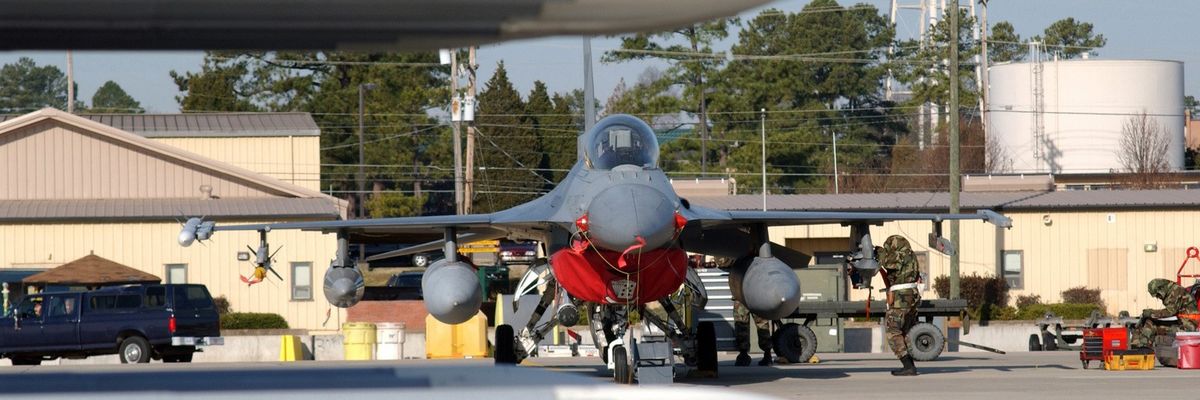In the first major foreign policy speech of his presidency, President Biden pledged to end “all American support for offensive operations in the war in Yemen, including relevant arms sales,” and committed to “stepping up our diplomacy to end the war.”
Now, the administration has sent Congress a legally mandated notification of the first proposed arms sales to Saudi Arabia since President Biden took office: 280 air-to-air missiles and 596 missile rail launchers valued at as much as $650 million.
U.S. security assistance to repeat human rights violators like Saudi Arabia has driven internal repression, state fragility, and strategic instability. Consequently, arms sales to the Gulf have drawn increasing bipartisan pushback. The United States has nonetheless continued to pursue the proposed weapons sale to Saudi Arabia, suggesting Biden’s limited security objectives vis-a-vis Iran hinder U.S. action to resolve the crisis in Yemen. The proposed sale, then, likely stems from the Biden administration’s concern about Iranian drone technology and efforts to reassure Saudi Arabia of continued commitment to the U.S.-Saudi relationship ahead of nuclear talks with Iran.
The Biden administration should instead condition any future sales on Saudi concessions in the Yemen peace process and implementation of human rights law in terms of sale.
The administration’s initial promise to end support for offensive operations in Yemen encouraged human rights organizations. However, President Biden has since faced criticism from advocacy groups for blurring the lines between offensive and defensive support for the Saudi-led coalition in Yemen, including after the administration’s decision to extend $500 million in maintenance contracts for Saudi military helicopters in September 2021. The House version of the annual National Defense Authorization Act, which is currently stalled in the Senate, even includes a progressive-backed measure prohibiting maintenance support that enables coalition strikes against the Houthis.
In an announcement about Thursday’s notification, the State Department pointed to the “increase in cross-border attacks against Saudi Arabia in the last year” and the use of air-to-air missiles in intercepting those attacks. A State Department spokesperson likewise emphasized Saudi self-defense, calling the proposed sale “fully consistent with the administration’s pledge to lead with diplomacy to end the conflict in Yemen while ensuring Saudi Arabia has means to defend itself from Iranian-backed Houthi air attacks.” Saudi authorities have blamed Houthi drones for attacks on Saudi airports and oil facilities.
Left unsaid, however, was growing U.S. concern around not only Houthi drone use, but also the drone capabilities of Iran and its other partners. Throughout the region, drones have proliferated and are increasingly used by non-state actors, an arms race many analysts argue the United States triggered with its unrestrained embrace of drone technology. Drone crashes and shootdowns have increased between Hezbollah and Israel. Similarly, in using small drones to harass Saudi Arabia, Iran has broadened its asymmetrical tactics. In October 2021, the United States announced sanctions on entities and individuals that supported Iranian Revolutionary Guard Corps’ drone program, reportedly in response to Iranian drones targeting U.S. forces in Iraq.
If the sale itself speaks to the Biden administration’s continued preoccupation with Iran, the announcement’s timing speaks to the administration’s continued prioritization of Gulf monarchies. Like the Obama administration, Biden’s State Department has often provided updates on nuclear negotiations with Iran in tandem with arms sales to Gulf partners like the United Arab Emirates and Saudi Arabia. These arms sales, like tactical training and other forms of security cooperation, are intended to bolster U.S. alliances in the Gulf and mark Biden’s continued commitment to a two-pronged Iran policy that distinguishes between nuclear and conventional defense goals.
The arms sale notification also comes as Congress is preoccupied with passing the Biden administration’s domestic agenda. Congress only has 30 days to pass a joint resolution prohibiting the sale and rally a supermajority to overcome a presumptive veto. With less than a month of legislative work remaining before the end of the year and a docket including the reconciliation bill, Build Back Better Act, and the National Defense Authorization Act, Congress is unlikely to muster the votes necessary to block the sale. Although legislators have introduced two bills that would facilitate congressional oversight in such situations, current law hampers the checks and balances that can safeguard human rights in arms transfers.
With the latest arms sale likely to proceed, it seems that re-affirming U.S. support for the Arab Gulf monarchies against Iran will outweigh the lofty human rights goals of Biden’s first speech. The notification of the latest arms sale to Saudi Arabia follows reports that the Saudi government is seeking U.S. assistance in defending against Houthi attacks as the United States pressures Saudi Arabia to end the blockade of Yemeni ports. As famine looms and the battle for the city of Marib intensifies, the blockade has deepened the world’s worst humanitarian crisis. Houthi negotiators demand the Saudi-led coalition lift the blockade as a condition to a ceasefire, and congressional Democrats have called for the blockade’s end on humanitarian grounds.
In moving forward with the sale without any meaningful change in Saudi behavior, the Biden administration signals unconditional support for the Saudi-led coalition’s actions, entrenching existing tensions in the Gulf — and America’s role in it — and increasing the risk of arms races and inadvertent escalation.
The views expressed in this article are those of the authors and do not necessarily reflect the official policy or position of their employers.
















